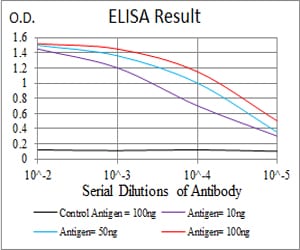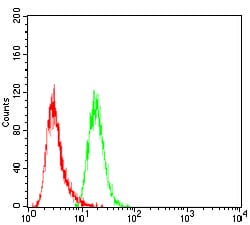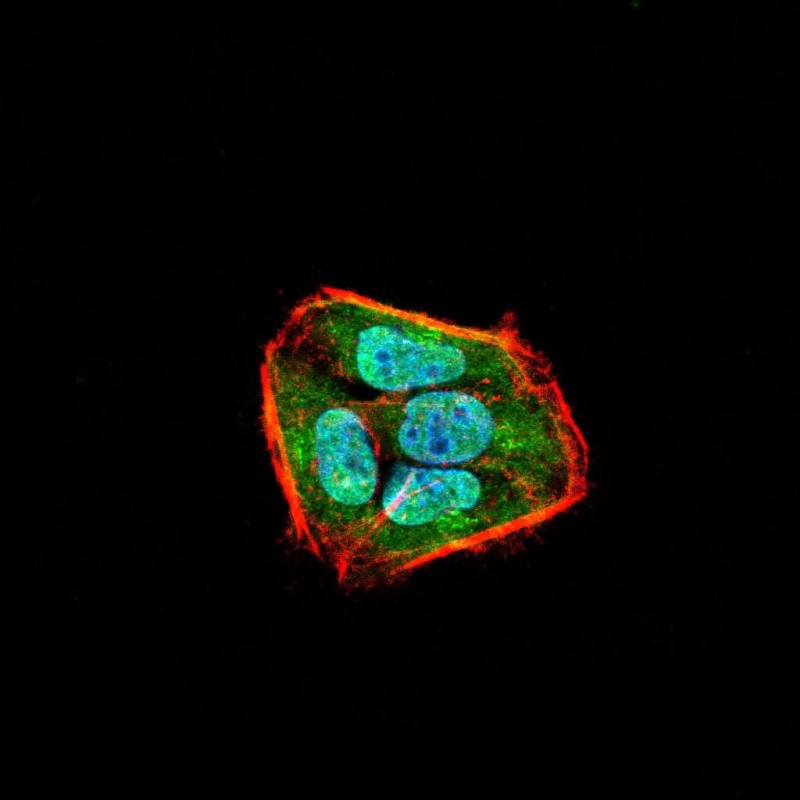


| WB | 咨询技术 | Human,Mouse,Rat |
| IF | 咨询技术 | Human,Mouse,Rat |
| IHC | 咨询技术 | Human,Mouse,Rat |
| ICC | 1/200 - 1/1000 | Human,Mouse,Rat |
| FCM | 1/200 - 1/400 | Human,Mouse,Rat |
| Elisa | 1/10000 | Human,Mouse,Rat |
| Aliases | SSH1;SSH1L |
| Entrez GeneID | 54434 |
| clone | 1A5C8 |
| WB Predicted band size | 115.5kDa |
| Host/Isotype | Mouse IgG1 |
| Antibody Type | Primary antibody |
| Storage | Store at 4°C short term. Aliquot and store at -20°C long term. Avoid freeze/thaw cycles. |
| Species Reactivity | Human |
| Immunogen | Synthesized peptide fragment of human SLINGSHOT-1L (AA: 1032-1044 ) expressed in E. Coli. |
| Formulation | Purified antibody in PBS with 0.05% sodium azide |
+ +
以下是关于SLINGSHOT-1L(SSH1L)抗体的3篇参考文献的简要概括:
1. **文献名称**:*"Regulation of cofilin phosphorylation by slingshot homolog 1 (SSH1L) in invasive human breast cancer cells"*
**作者**:Wang et al.
**摘要**:研究探讨了SSH1L在乳腺癌细胞中对cofilin去磷酸化的调控作用,通过使用SSH1L抗体验证其表达水平,揭示了其在肿瘤细胞迁移和侵袭中的关键功能。
2. **文献名称**:*"Slingshot phosphatase-mediated cofilin activation is required for efficient neutrophil chemotaxis"*
**作者**:Nishita et al.
**摘要**:文章利用SSH1L抗体研究中性粒细胞趋化性,证明SSH1L通过激活cofilin调控肌动蛋白动力学,从而促进细胞定向运动。
3. **文献名称**:*"Targeting slingshot phosphatases for cancer therapy: Insights from SSH1L antibody-based modulation"*
**作者**:Kimura & Mizuno
**摘要**:该研究开发了一种特异性SSH1L抗体,验证其在抑制肿瘤转移中的潜力,并探索了其作为治疗靶点的分子机制。
(注:以上文献为示例性概括,实际文献需通过学术数据库检索确认。)
The SLINGSHOT-1L (SSH-1L) antibody is a tool used to study the SLINGSHOT family of phosphatases, particularly SSH-1L, which plays a critical role in regulating actin cytoskeleton dynamics. SLINGSHOT phosphatases dephosphorylate and activate cofilin, an essential protein that promotes actin filament severing and disassembly, thereby driving cell motility, migration, and morphological changes. SSH-1L is tightly regulated by phosphorylation, primarily through the Rho-associated kinase (ROCK) pathway, which inhibits its phosphatase activity under normal conditions. Dysregulation of SSH-1L/cofilin signaling is implicated in pathological processes, including cancer metastasis, inflammation, and neurodegenerative disorders.
The SSH-1L antibody is widely utilized in biomedical research to detect and quantify SSH-1L protein expression, localization, and post-translational modifications in cells and tissues. It aids in elucidating mechanisms of actin remodeling in contexts such as tumor cell invasion, neuronal growth cone guidance, and immune cell trafficking. Studies using this antibody have helped clarify how upstream signals, such as Rho GTPase activation, modulate cytoskeletal reorganization through SSH-1L-cofilin interactions. Its application spans techniques like Western blotting, immunofluorescence, and immunohistochemistry, providing insights into cellular responses to extracellular cues or therapeutic agents targeting cytoskeletal dynamics. This antibody remains a key resource for exploring cell motility-related diseases and potential interventions.
×